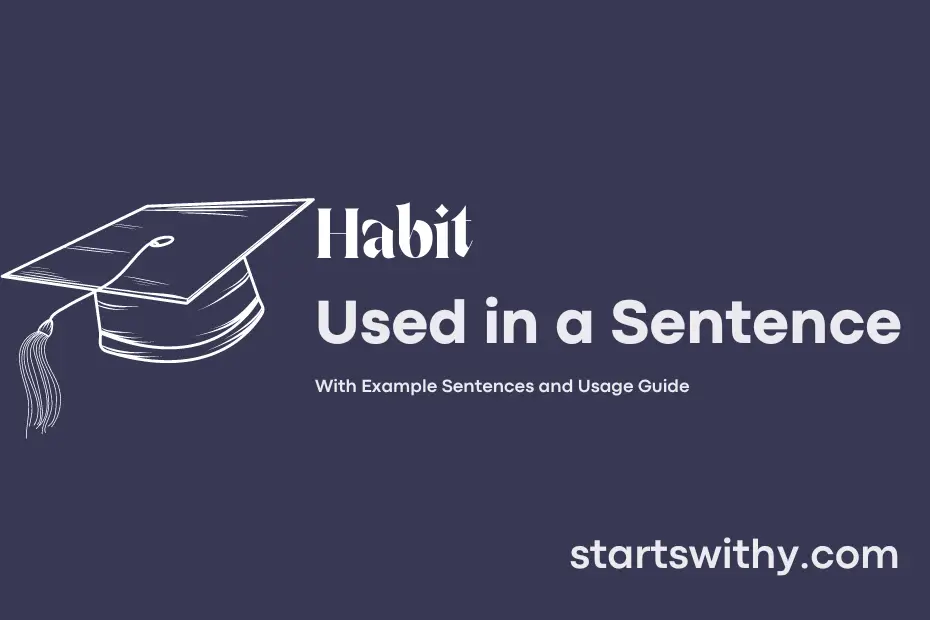Do you find yourself repeating certain actions or behaviors almost automatically? If so, you may be experiencing a habit. A habit is a routine or behavior that is often performed unconsciously, triggered by a specific cue or context.
Habits can be either beneficial or detrimental to one’s life depending on the nature of the behavior. They are formed through repeated actions and can be difficult to break once established. By understanding the mechanisms behind habits, individuals can learn to either cultivate positive habits or work towards changing detrimental ones.
7 Examples Of Habit Used In a Sentence For Kids
- Habit of brushing teeth every morning is important.
- We should make a habit of drinking water throughout the day.
- It is good to have the habit of helping each other.
- Cleaning up our toys is a good habit to have.
- Eating fruits and vegetables is a healthy habit.
- Let’s make it a habit to say “please” and “thank you”.
- Reading books before bedtime is a relaxing habit.
14 Sentences with Habit Examples
- Habit of taking regular breaks while studying is important for maintaining focus.
- College students often struggle to break the habit of procrastination.
- Cultivating the habit of time management can greatly improve academic performance.
- Establishing a habit of attending lectures and participating in discussions is beneficial for learning.
- Creating a habit of reviewing notes before exams can help in retaining information.
- Developing the habit of seeking help from professors when needed is a sign of academic maturity.
- The habit of staying organized with study materials can save a lot of time and effort.
- It’s common for college students to develop the habit of relying on unhealthy snacks during late-night study sessions.
- Building a habit of active listening in class can enhance understanding of complex topics.
- Participating in extracurricular activities can foster the habit of teamwork and leadership skills.
- Forming the habit of exercising regularly can have positive effects on overall well-being.
- Getting into the habit of setting aside dedicated study hours can improve productivity.
- Adopting the habit of seeking feedback on assignments can help in identifying areas for improvement.
- Creating a habit of practicing mindfulness or meditation can reduce stress and anxiety levels.
How To Use Habit in Sentences?
To use the word “habit” in a sentence, think about a regular behavior or routine that someone does repeatedly. For example, “Exercising every morning has become a habit for me.”
When constructing a sentence with the word habit, it is important to ensure that the context is clear and the meaning is conveyed effectively. You can describe a habit that someone has, whether it is positive or negative.
Here are a few examples of how you could use the word habit in a sentence:
- “She has a habit of biting her nails when she’s nervous.”
- “Reading before bed has become a nightly habit for him.”
- “Changing your habit of procrastination can lead to increased productivity.”
Remember that the word habit refers to a behavior that is repeated regularly and often done unconsciously. When incorporating it into a sentence, consider the tone and style you want to convey. Be clear and concise in your sentence construction to effectively communicate the habit being described. With practice, you will become more comfortable using the word habit in a variety of contexts.
Conclusion
In conclusion, cultivating positive habits is essential for achieving long-term success and personal growth. Consistently engaging in habits that align with our goals and values enables us to make progress, build resilience, and enhance our overall well-being. By consciously forming and reinforcing beneficial routines, we can improve our productivity, health, and happiness.
Conversely, unhealthy habits can hinder our progress and hold us back from reaching our full potential. Breaking free from destructive patterns and replacing them with positive behaviors is a journey that requires dedication and effort. Through awareness, mindfulness, and commitment, we can reshape our habits to create a more fulfilling and rewarding life.



